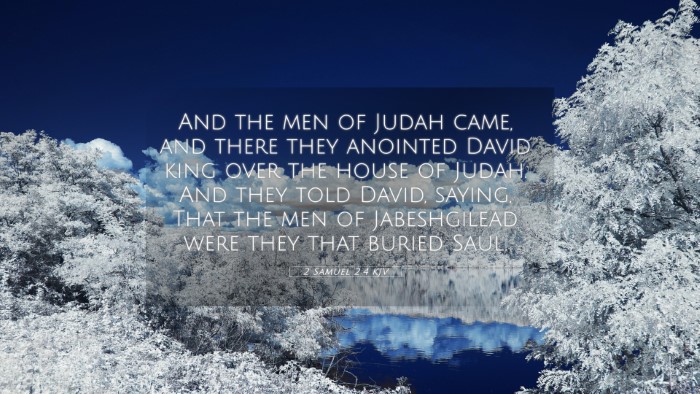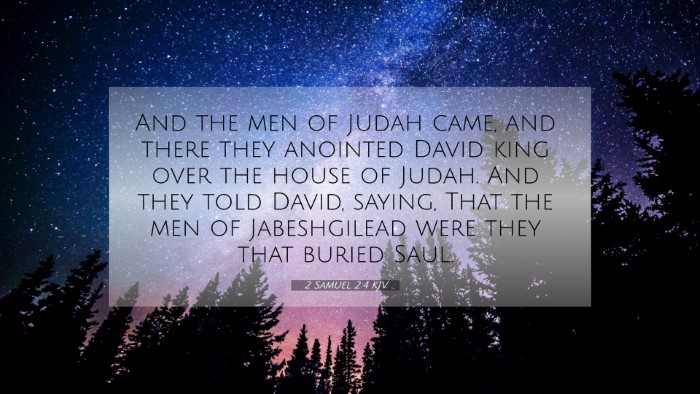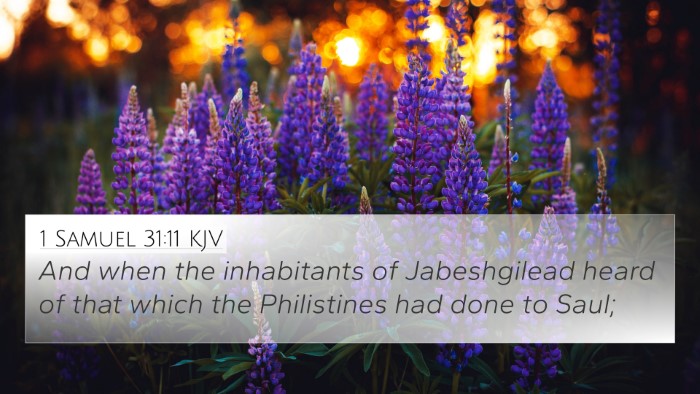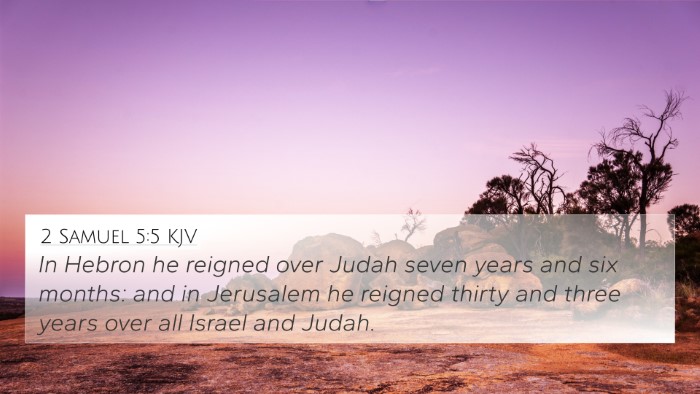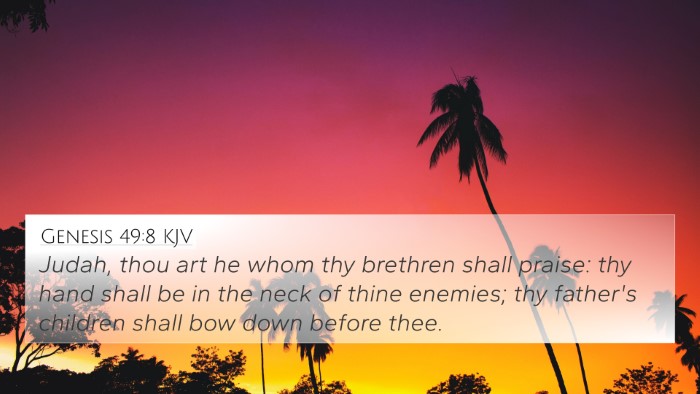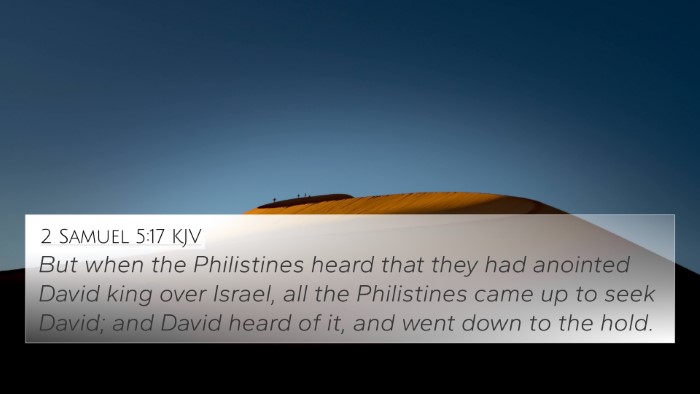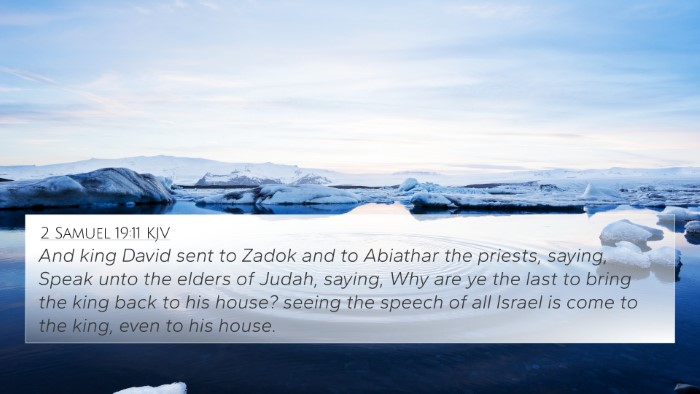Understanding 2 Samuel 2:4
Bible Verse: 2 Samuel 2:4 - "And the men of Judah came, and there they anointed David king over the house of Judah. And they told David, saying, That the men of Jabeshgilead were they that buried Saul."
Meaning and Interpretation
This verse marks a significant moment in the biblical narrative, depicting David's anointing as king over the tribe of Judah at Hebron. The context is rooted in the aftermath of Saul's death, reflecting themes of loyalty, tribal identity, and divine appointment.
Insights from Public Domain Commentaries
- Matthew Henry: Emphasizes the importance of David's anointing as a fulfillment of God's promise. It signifies not only the designation of a new king but also the beginning of the unification of Israel under David's leadership. Henry notes that the men of Judah’s decision illustrates their loyalty to David and contrasts with the divisions in Israel.
- Albert Barnes: Points out that this anointing represents the official acknowledgment of David's kingship, validating his previous anointing by Samuel. Barnes discusses the significance of Judah's support, which was critical in establishing David's reign and consolidating his authority in the region.
- Adam Clarke: Highlights the actions of the men of Jabeshgilead in burying Saul, indicating a response to their former king’s death. Clarke discusses the implications of this loyalty, detailing how it reflects the complicated politics of the time and foreshadows future events in David's reign.
Thematic Connections
2 Samuel 2:4 can be linked to several other passages that enhance our understanding of this moment in biblical history:
- 1 Samuel 16:13: David is anointed by Samuel, establishing his divine selection as king.
- 2 Samuel 5:1-3: The subsequent anointing of David as king over all Israel demonstrates the fulfillment of this initial anointing.
- 1 Chronicles 12:23-40: Describes the gathering of supporters for David, emphasizing his acceptance as king.
- Psalm 78:70-72: Reflects on God's choice of David as shepherd and king, reaffirming his role in leading Israel.
- Matthew 1:6: Discusses David's vital significance in the lineage of Jesus, showcasing his lasting legacy.
- Romans 13:1: Discusses the divine ordination of authority, echoing the theme of God's sovereignty in leadership.
- Acts 13:22: Highlights God's selection of David as a man after His own heart, reinforcing his suitability as king.
- Hebrews 1:5: Connects the theme of sonship to David's lineage and the messianic expectation surrounding Jesus.
- 1 Peter 2:9: Parallels the concept of royal priesthood, reflecting the identity of believers in Christ.
- Zechariah 12:7: Speaks to God's protection of Judah, the tribe that first acknowledged David as king.
Cross-Referencing and Comparative Analysis
For those looking to delve deeper into the connections between Bible verses, the act of cross-referencing can unveil a richness of understanding and themes throughout the Scriptures.
When studying 2 Samuel 2:4, employing tools for Bible cross-referencing can prove beneficial.
- Tools for Bible Cross-Referencing:
- Bible concordance
- Bible cross-reference guide
- Cross-reference Bible study methodologies
- Comprehensive Bible cross-reference materials
This process involves examining how different passages relate to one another, particularly between the Old and New Testaments. By identifying connections, such as the lineage from David to Christ, believers can better understand key themes, such as God's faithfulness and sovereignty.
Application and Spiritual Insights
As believers engage with 2 Samuel 2:4, they are encouraged to reflect on their own allegiances and support for God's appointed leaders today. Just as the men of Judah rallied to David, Christians are called to support the leaders whom God has placed in their midst, fostering unity within the body of Christ.
This verse can serve as a reminder of the importance of loyalty, trust, and recognition of divine authority in both personal and communal faith experiences.
Conclusion
Understanding 2 Samuel 2:4 requires examining not only the text itself but also its broader implications within the biblical narrative. By engaging in comparative Bible verse analysis and thematic connections, believers can appreciate the unfolding drama of God's plan through history and the inner workings of faith, leadership, and community.

